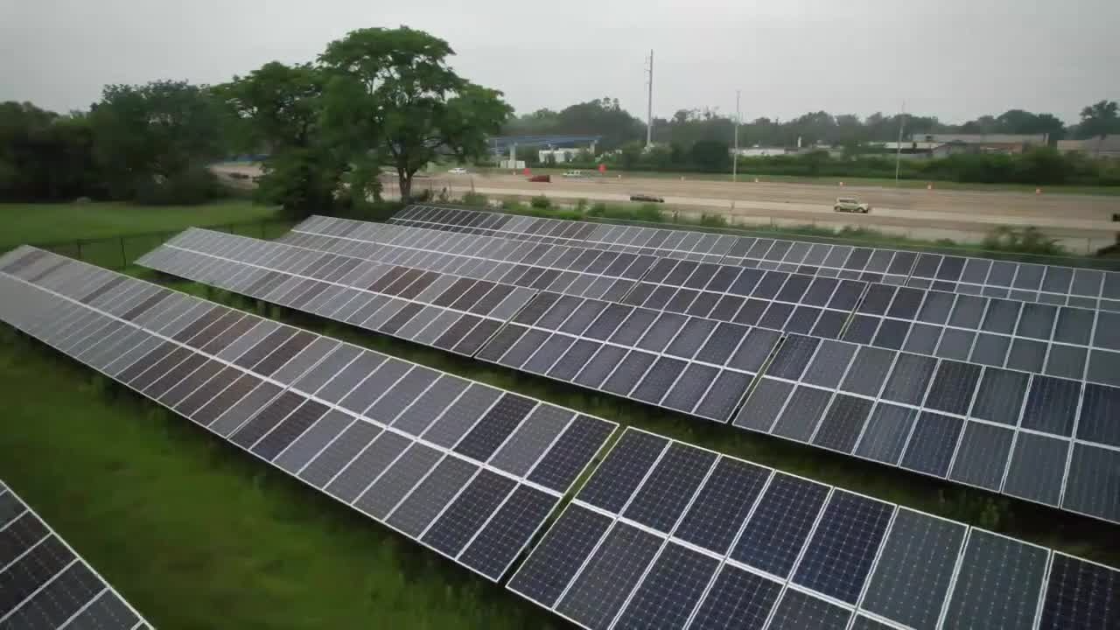Detroit City Council approves second phase of Neighborhood Solar Initiative
The city started looking for communities interested in building solar fields to eradicate blight last year. Three neighborhoods were selected from the eight finalist communities.
-
-
The Detroit City Council approved the second phase of a plan to build solar arrays in neighborhoods on Tuesday
-
In total, five solar arrays will power governmental buildings. They will be built on vacant land acquired by the city
-
Mike Duggan’s team was worried the incoming Trump administration could pull back federal funding, which is paying for the Neighborhood Solar Initiative
-
-
The Detroit City Council approved the second phase of a plan to build solar arrays in neighborhoods on Tuesday
-
In total, five solar arrays will power governmental buildings. They will be built on vacant land acquired by the city
-
Mike Duggan’s team was worried the incoming Trump administration could pull back federal funding, which is paying for the Neighborhood Solar Initiative
DETROIT (FOX 2):At its weekly meeting on Tuesday, the Detroit City Council approved the second phase of the mayor’s neighborhood solar plan.
The neighborhoods in Houston-Whittier/Hayes and Greenfield Park are included in the solar field construction contracts with DTE and Lightstar. The sole person to vote against the motion was Councilmember Angela Whitfield-Calloway.
Detroit has spent the last few months trying to find a way to purchase public property so that solar panels can be installed to assist power government buildings.
There has been a lot of discussion regarding how to buy the site where the residents currently reside, how to involve community organizations in the process of choosing which arrays to erect, and if it is legal to use the area for energy production.
Council members are trying to expedite the project’s second phase, which encompasses the Houston-Whittier/Hayes and Greenfield Park communities, due to worries about losing federal money.
The vicinity around Greenfield Park
Presently:
Although plans to install solar panels in Detroit have been approved, the city’s legal team is still trying to find the land needed to erect the arrays.
The city’s legal counsel, Conrad Mallett, reported that it had acquired 965 land parcels, including assisting in the relocation of more than 150 homes. “The city is only involved in two lawsuits from homeowners who claim the process is illegitimate,” he told the council.
“A remarkably successful endeavor from a litigation standpoint,” observed the judge.
They are on target to demolish 90 structures by March, according to Trisha Stein, who works with Duggan. Crews are anticipated to clear ground for the arrays during the summer, and in the fall, panels will begin to be erected.
“As part of the community benefits agreement reached between affected homeowners and the city, 156 homes will also receive energy efficiency upgrades,” she added.
Look more closely:
Detroit’s departing mayor has promoted the solar field plan since he first proposed it as a way to transform undeveloped space into useful city property.
The solar arrays are being paid for by Detroit using federal funding from the Inflation Reduction Act. However, Mike Duggan and city officials are uneasy about the incoming Republican administration because President-elect Donald Trump has pledged to rescind the IRA.
Duggan’s team encouraged the city council on Monday to expedite the initiative’s second phase, which would add an additional 61 acres of land and produce about 10 megawatts of electricity.
The backstory
Detroit has adopted a new energy strategy by suggesting that municipal buildings be powered by massive solar farms situated on undeveloped land in its neighborhoods.
The goal of the Neighborhood Solar Initiative is to use 33 megawatts of electricity produced on 165 acres of open space to power all 127 governmental buildings in the city.
The council covered about 100 acres in three communities: State Fair, Van Dyke/Lynch, and Gratiot-Findlay.
depictions of the solar arrays in each community.
Two businesses were chosen to build the fields: DTE of Detroit and Lightstar Renewables of Boston.
The solar panels were financed by a federal stimulus plan that supports climate-related initiatives. The arrays would save the city $6.6 million in energy bills, but they would also cost $8.3 million to operate.
The Findlay/Gratiot Region
-
This story was based on information from the Detroit City Council and the mayor’s office.
This story was based on information from the Detroit City Council and the mayor’s office.











